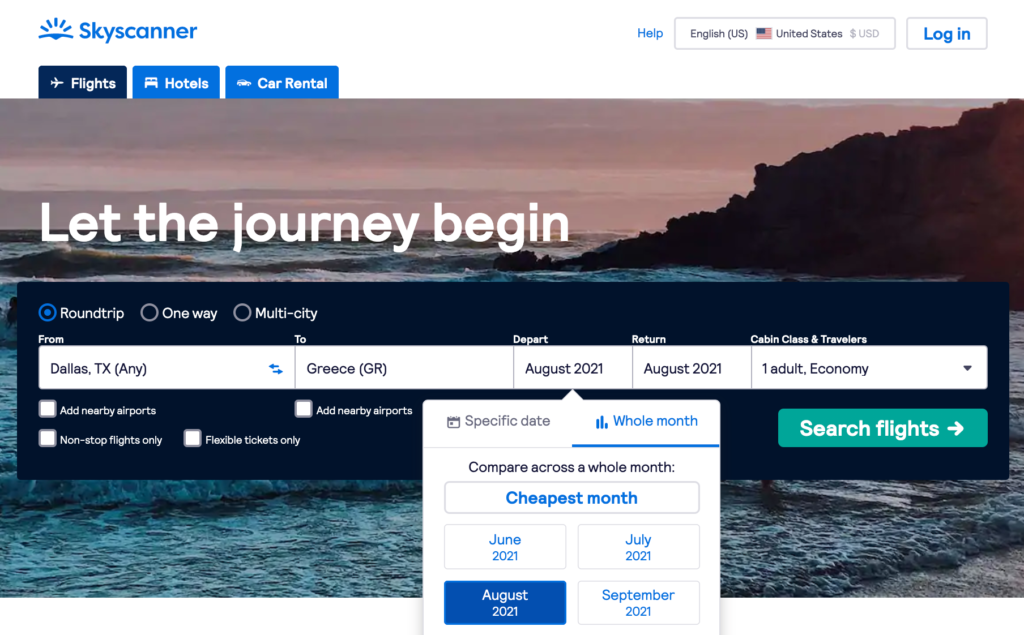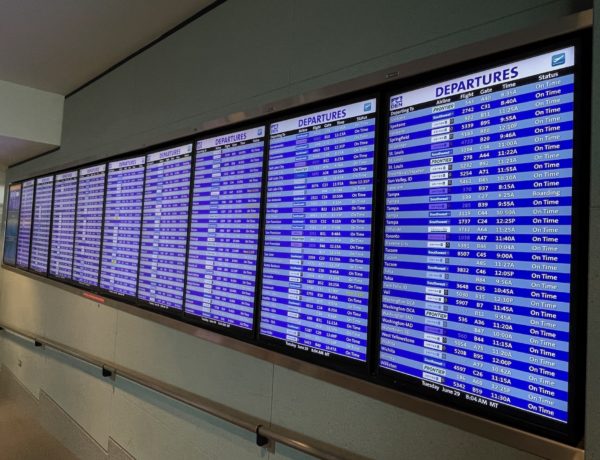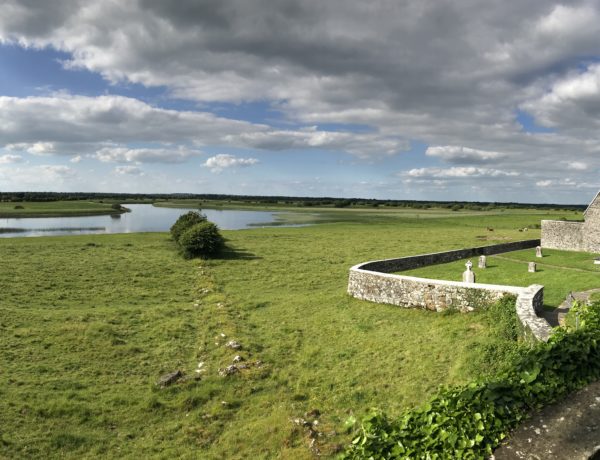Traveling can be scary and overwhelming for some, but fear of the unknown doesn’t have to keep you from the experiences you’re dreaming of. Whether it’s your very first trip, your turn to plan, or even if you’re a seasoned explorer, it never hurts to have a few tips from a travel agent up your sleeve.
I’m fortunate to come from a family that has worked in travel nearly all my life. My dad worked for the airlines, and my mom was a travel agent for several years. Combined, they’re a traveling power couple gracious enough to pass down their wisdom to me.
From the obvious to the often overlooked, here are our family’s top tips.
Table of Contents
Beware of Trends
Finding good airfare is a bit of a game, so it helps to know the “rules.” While airfare is absolutely subject to change, there are a few factors that can influence rate hikes and you can use timing to your advantage.
Seasonality and popularity are the most significant factors in price and the easiest to plan around. You know those headlines you see on Instagram and travel sites, “Top 10 Destinations for Summer,” or “Trending Destinations?” While those stories can be a great source of inspiration, it’s practically in the headline that everyone else will be going there too. Translation: airfare, accommodations, and excursions can all hike their prices because of the increase in demand. Instead of using those articles to plan where to go, use them to plan where to avoid.
Lesson’s learned…
Visiting during a destination’s off-season or shoulder season can be a great way to cut back on costs; just make sure you know what to expect.
Make sure you know seasonality too. If you’re planning a solo trip to Hawaii in March, maybe you’re wondering why it’s so expensive? Beyond the great weather and frequent whale sightings that time of year, March is also Spring Break for families across the United States. So you can pretty much bet that all beaches, ski resorts, and other family-friendly destinations will be at their peak price.
On the flip side, maybe you’re planning a family vacation to Paris in August and can’t understand why it’s so cheap. That’s because Paris becomes a ghost town in August as locals take off on vacation for nearly the whole month. That means a lot of restaurants and attractions will have reduced hours or may be closed altogether.
Know Your Fare Days
Your best bet for finding a great rate is to plan ahead and know when to book. In general, most airlines offer their best fares on Tuesdays and Wednesdays.
Lessons learned…
If you find a fare that fits your budget – just book it! I’ve learned the hard way too many times that if something seems too good to be true, it usually won’t last. Visions of $600 fares to Greece from Texas still haunt me.
If you’re planning domestic travel, book at least 4 weeks – 4 months in advance. For international trips, you’ll typically get the best rate 4-6 months prior to departure.
And take advantage of holds for airlines that offer them! A good rule of thumb is to check rates on Tuesday, hold if it’s within your budget, and confirm on Wednesday. Many airlines will also allow you to cancel a booking within 24 hours.
Do Your Research
Doing your research doesn’t mean you have to plan every minute of every day. It’s more about narrowing down what’s most important to you and ensuring you can make it happen within your timeline and budget.

For flights, start with SkyScanner.com. It’s an online travel agent (OTA) that compares flights, hotels, cars, and providers of all sizes. If you’re flexible on your dates, they also have a feature that lets you check prices for an entire month. Searching “Whole Month” will show you which dates are cheapest. You can then use this as a guide for planning the rest of your trip.
Lessons Learned…
Until I became a travel writer, I didn’t know that a destination’s convention and visitor’s bureau (CVB) is a treasure-trove of ideas! They include details on places to stay, eat, adventure, and sometimes they even offer discounts. Don’t skip this goldmine!
Booking.com is a great comparison site for hotels, and they’ve started including apartment rentals also. In most cases, you can book now, pay later, and nearly all accommodations come with some cancellation policy. I like this site because it’s easy to navigate, and the rates/amenities are prominently listed, reducing guesswork.
Always remember to check the provider’s site directly too. For example, if you find a good rate for Marriott on Booking.com, check their website to see if you can get an even better one. Hotels, airlines, and other providers pay a fee for every booking on OTAs, so you may be able to find better deals booking direct.
Get a Better Credit Card
Credit cards can be a source of anxiety for many of us, but when leveraged the right way, they can take you so much farther in your travels. Not only can you accrue points to be used on future trips, but credit cards can also protect you while you’re on the road.
Most banks and credit cards offer some sort of point system now, so there’s no reason not to take advantage of these programs. They’re an easy way to accelerate earning points, miles, and status that can help you travel at a hefty discount, not to mention the perks of upgrades and generally better service.
Lessons Learned…
If you don’t travel often, make sure to call the number on the back of your card before your trip. Let the issuer know where you’re headed, so they know those transactions are most likely from you. Otherwise, you could end up with a canceled card on the other side of the world. Trust me; it’s not a situation you want to find yourself in!
In addition to savings and perks, many credit cards include some type of travel insurance. That could include protection from cancellations, lost baggage, or even coverage for rental cars. Of course, these policies change all the time, so make sure you double-check what’s available before setting out, but it’s a great place to start and cheaper than most third-party travel insurance.
And at the very least, if you run into problems with a purchase you make while traveling, it’s easier to dispute a charge with your credit card company than a vendor in another city or country. Let the card issuer fight that battle for you.
Stay Loyal
Lessons Learned…
When I say “use religiously,” I mean it – going out with a big group? Offer to put the tab on your card if they can give you cash. Traveling for work? Purchase everything on your personal card to expense, don’t use a corporate card. Even if your company is slow about reimbursing you, traveling for work, entertaining clients and purchasing office supplies are big-ticket items that can accelerate your earnings.
To maximize loyalty rewards, you’ll want to find your favorite airline and preferred hotels and use them religiously. If you think you don’t need a loyalty number because you don’t travel enough, remember every point counts. Even if it takes you a decade to earn enough to redeem, at least you’re building toward something.
Taking the credit card idea further, if you don’t have time (or the inclination) to read all the fine print and manage multiple credit cards for max perks, keep the focus narrow. Get a credit card dedicated to a specific airline’s mileage program or a particular hotel’s loyalty points and use the *ish out of them. It’s the fastest way to earn status and the perks that come along with it.
Pick the Right Travel Buddy
Lessons Learned…
Truth be told, I’m a huge fan of traveling solo because I can do what I want when I want. I also have a tiny group of friends (1-2) that I travel with to new places because I know we mesh well in activity type and energy level. When traveling with my other friends and family, I typically opt for places I’ve been before, so I don’t have to worry about missing out on anything I absolutely must do.
Everybody has a different idea of their perfect trip. That idea permeates every aspect of it too. From the mode of transportation, type of accommodation, activity preferences, downtime, etc. Picking a travel buddy with a style opposite of yours is a recipe for disaster.
If you’re the active type and travel with someone who prefers to stay at the hotel or take three-hour naps, you’ll find yourself doing a lot of things alone. Maybe that sounds ok to you, but keep in mind that many experiences are more expensive when planned for one than when they’re shared with a group. Maybe it’s as simple as your sleep patterns too. If one of you is an early-to-bed, early-to-rise explorer and the other is a night owl, it’ll be tough to acclimate to each other on the road.
Give Yourself More Time (and Budget)
Lessons Learned…
On one of my trips to Vegas, my friend and I met a local couple, and we hit it off immediately! They offered to show us around “real Vegas” that night, taking us to a hole in the wall for dinner and a honky-tonk to dance the night away. It was a blast, and we got to experience something we’d have never even known to look for otherwise.
Very few places can be fully explored in a finite amount of time. This becomes especially true when your itinerary covers a large area like national parks, entire regions (wine country), or other countries. While researching, you’re likely to find sample itineraries ranging from 1 day to 2 weeks. As you review and begin to plan your own itinerary based on your must-sees, add on at least an extra 1-2 days.
It’s easy to underestimate how tired you’ll be from your travels or how much downtime you’ll want. This is especially true for road trips. It’s crazy how tired sitting all day can make you. But more than that, if you’ve planned every minute of every day, you’re guaranteed to miss out on some of the most magical parts of any trip. That could be anything from unique photo ops uncovered as you wander around town, an attraction you wish your tour had spent a little more time at, and especially the chance to make new friends.
Don’t Get Overwhelmed
Traveling should be accessible to everyone – and fun! As long as you plan your big expenses ahead of time (airfare, hotel, car) and take advantage of the tricks of the trade, the rest will fall into place.
I also like to encourage building guidelines vs. itineraries – an itinerary forces you to have everything planned in advance and can keep you from discovering something unexpected. When I travel, I like to list all the things I must do and others I could do, though using it as a guide. That way, I have the flexibility to change course and follow my imagination.


